





Chapter Twelve: "The Enemy Stands on the Right!"
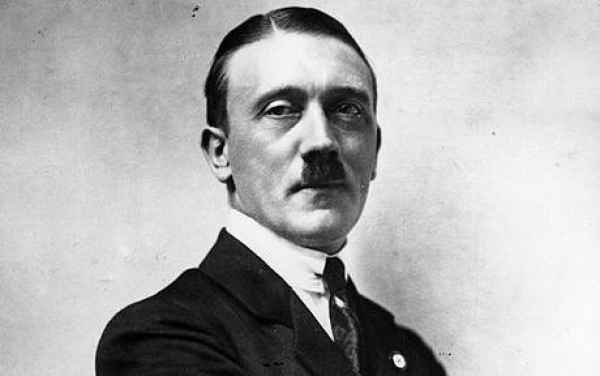
The year 1921 found the young movement robustly moving forward as far as propaganda, agitation, etc., were concerned, but behind and undeveloped internally . . . . The young movement was to supply what the others lacked: a voelkish movement with a strictly public base including the broadest masses, welded together by iron-hard organization, filled with blind obedience, and inspired with brutal determination: a party of battle and action. 1
1922 January 12 Adolf Hitler testifies for over two hours during his trial for criminal defamation stemming from a physical attack on the leader of the Bavarian League (Bayernbund), Otto Ballerstedt, a political opponent. Ballerstedt's ilk are nothing but "raving separatists" intent on "breaking up the Reich ... following the same goal that the French have followed for three-hundred years." Hitler's Nazi party was "rejecting, for the present, all monarchies", and was opposed to "all dictatorship by force", but it would, of course, prefer a Ludendorff dictatorship to Ballerstedt's inane schemes. Hitler is convicted and is sentenced to three months in prison, with two months suspended in anticipation of good behavior. After appeals and such, Hitler and his co-defendants-Hermann Esser and Oskar Koerner-will serve their terms during the summer. 2The mouth of Adolf Hitler always twisted when my name, Otto Ballerstedt, was mentioned. Numerous people told me so, and I knew anyway since Hitler had occasionally tried to interrupt me at some of my Bavarian League meetings as well as at general political rallies. One time, he ended an outburst by asserting: "The Jews have woven an international spider web to trap vital resources for themselves and to ensnare anyone who wants to stop them."
I at once opened my eyes and mouth so very wide, and said, "Well, Herr Hitler, my goodness, indeed. That sounds like an awfully fearsome predicament we're in. I've seen some rather unsightly spider webs, but none so gruesome as that conjured by you. And during numerous forays for facts, I've discussed many matters, international and political, with many men of note, and not one has ever reported a sighting such as yours, even in the metaphorical sense. I tell you, Herr Hitler, to those who worldwide number but several million, you attribute the most pervasive and astounding feats of financial and physical might. You must think each Jew possesses the capabilities of ten Aryans, or else how could you be so convinced they have the power to ruin us all?" Slurs and snickers flew at Hitler, and his mouth twisted even more.
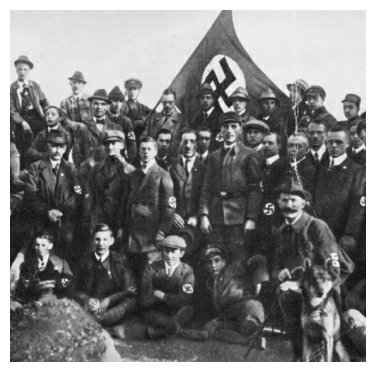
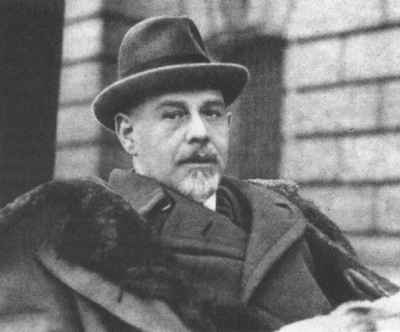
And Rathenau, old Walther,
Shall have a timely halter!
Shoot down Walther Rathenau,
The goddamned swine of a Jewish sow. 10
"Making one Walther Rathenau foreign minister really is going too far," shouts Hitler. The crowd responds: "Rathenau Judensau" ("Rathenau, Jewish pig!"). "Our young girls are being seduced by the Jews and thus our people is being contaminated. Every Jew who is caught with a blond girl should be ... HANGED! . . . . I don't want to say hanged, but there should be a court that condemns these Jews to death." 11
1922 February 18 The People's Court of Munich rejects the appeal of Hitler's three-month sentence for his 1921 attack on Otto Ballerstedt. Besides having to eventually serve the sentence-following yet another appeal-he is placed on probation for four years. 12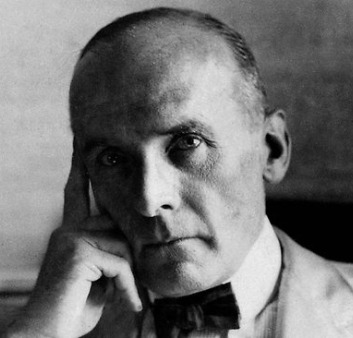
So this is what it has come to! Hundreds of thousands of Jews can immigrate from Galicia and spew out their poison in all the newspapers, but for the "German" government, a man immediately becomes a "foreigner" if he was born a few kilometers on the other side of the Bavarian boundary posts and is scraping together all the forces which have any character left to combat the parasites. A man who, in addition, served and shed blood for the German Fatherland for four and one-half years in the most forward trenches, who, as a simple soldier, was awarded the Iron Cross, First and Second Class; who, in the final analysis, defended the jelly-bellies who now do the talking. 15
1922 April 16 The Treaty of Rapallo, between Germany and Russia, is signed in Rapallo, Italy, by foreign minister of the Russian Socialist Federal Soviet Republic, Georgi Chicherin, and the German Foreign Minister, Walther Rathenau. Each party agrees to normalize their diplomatic relations, and to "co-operate in a spirit of mutual goodwill in meeting the economic needs of both countries". Both renounce all territorial-and any other-claims stemming from Brest-Litovsk and the events of the Great War. 16
That the so-called enlightened absolutism of a Frederick the Great was possible depended solely on the fact that, though this man could undoubtedly have decided 'arbitrarily' the destiny-for good or ill-of his so-called 'subjects,' he did not do so, but made his decisions influenced and supported by one thought alone, the welfare of his Prussian people. It was this fact only that led the people to tolerate willingly, nay joyfully, the dictatorship of the great king.
AND THE RIGHT HAS FURTHER COMPLETELY FORGOTTEN THAT DEMOCRACY IS FUNDAMENTALLY NOT GERMAN: IT IS JEWISH. It has completely forgotten that this Jewish democracy with its majority decisions has always been without exception only a means towards the destruction of any existing Aryan leadership. The Right does not understand that directly every small question of profit or loss is regularly put before so-called 'public opinion,' he who knows how most skillfully to make this 'public opinion' serve his own interests becomes forthwith master in the State. And that can be achieved by the man who can lie most artfully, most infamously; and in the last resort he is not the German, he is, in Schopenhauer's words, 'the great master in the art of lying'-the Jew . . . .
AND NOW I WOULD ASK THOSE WHO TODAY CALL US 'AGITATORS': 'WHAT THEN HAVE YOU TO GIVE TO THE PEOPLE AS A FAITH TO WHICH IT MIGHT CLING?' Nothing at all, for you yourselves have no faith in your own prescriptions. That is the mightiest thing which our Movement must create for these widespread, seeking, and straying masses: a new Faith which will not fail them in this hour of confusion, to which they can pledge themselves, on which they can build, so that they may at least find once again a place which may bring calm to their hearts. [For the full text of Hitler's speech, Click here.]
The careful preparation of gatherings is . . . one of the uppermost tasks of the leadership of individual local groups. Munich can be regarded as a perfect example in this respect. Although we have repeatedly requested that the first meetings of the local group never take place in a hall that is too large . . . one of our local groups-Mannheim-held its first major public gathering in a room which was much too large and suffered a fiasco. 18
1922 April Hitler pleads his case in an open letter to Count Lerchenfeld, the new Bavarian premier:I admit that by the letter of our present Jewish law, I really am a 'foreigner.' I might argue, Your Lordship, that my birthplace is only two hundred and fifty yards from the Bavarian border, that it was Bavarian territory a hundred years ago, and, as I hope, will be returned to the German Reich in less time than that . . . . Blood is thicker than water, Your Lordship, and by blood I am not only proud to be a German, but even prouder that fortune permitted me to stake my blood for my Germanism. At that time, it would have been child's play for me, Your Lordship, to win citizenship. I neglected to do so, because I ventured to retain my unshakable hope in a greater Germany, and also my conviction that a day would come when a German's right to work with his people would not be judged by papers and certificates, Your Lordship, but exclusively by his blood and by his worth. 19
1922 May 6 The German-Russian commercial agreement is finalized with a public signing. 20
We do not want to awaken peace and insight and harmony, but rather hate! Hate for the criminals who rendered meaningless the death of our heroes, and who are still our "leaders" today. We also want to incite hate for those who deserve no mercy, those who are still selling out and betraying us, who still want to lead us to the slaughter; not to liberation, but to bled-to-death ruin. We want to forge a sword of revenge . . . .
The Jew has not become poorer. He is gradually puffing up. And if you don't believe that, I ask you to look at our health resorts. There you'll find two types of people: the German who goes there for the first time in a long time to get some fresh air and to recuperate, and the Jew, who goes there to lose his fat. And go into our mountains. Whom do you find there in brand-new, splendid yellow hiking boots, with pretty backpacks in which there is usually nothing useful? And why should there be? The Jews go up there to the hotel, usually as far as the railway goes, and where the train stops, they stop too. Then they just sit around within a kilometer of the hotel, like blowflies around a corpse . . . .
Count Lerchenfeld said in the last session of parliament that his feeling "as a human being and a Christian" would prevent him from being an anti-Semite. I say: my Christian feeling tells me that my lord and savior is a warrior. It calls my attention to the man who, lonely and surrounded by only a few supporters, recognized the Jews for what they were, and called for a battle against them, and who, by God, was not the greatest sufferer, but the greatest warrior. . . .
As a human being, it is my duty to see to it that humanity will not suffer the same catastrophic collapse as did that old civilization two thousand years ago, a civilization which was driven to its ruin by the Jews. ... I am convinced that I am really a devil and not a Christian, if I do not feel compassion and do not wage war, as Christ did two thousand years ago, against those who are stealing from and exploiting these poverty-stricken people.
Two thousand years ago a man was similarly denounced by this particular race which today denounces and blasphemes all over the place. . . . That man was dragged before a court and they said: he is arousing the people! So he, too, was an agitator! 21
He described in breathtaking words what had made Germany great: the systematic education of German males to physical fitness, the spirit of most loyal comradeship, the will to unconditionally obey the recognized leader . . . . The speaker closed with an appeal to the Jugendbund to practice obedience and discipline in their relationship with the Fuehrer. 22
1922 June 22 With party leader Hitler due to report to the authorities to begin his sentence, the Völkischer Beobachter opines: The imprisonment of Adolf Hitler ... is, objectively, a slap in the face of all true Germans in Bavaria." 23Meanwhile, by noon on the day of the murder, the news had spread and the workers began swarming from the factories and shops to form countless processions. These soon merged into one, and moved solidly and irresistibly through the streets . . . . Four deep they marched in their hundred[s of] thousands beneath their mourning banners, the red of Socialism and the black-red-gold of the Republic, in one endless disciplined procession, passing like a portent, silently along the great thoroughfares lined by immense crowds, wave after wave, from the early afternoon till late into the June sunset. 27
1922 June 25 Chancellor Wirth addresses the Reichstag, speaking of the murder of his Foreign Minister, Walther Rathenau, and putting the blame squarely on the agitators of the Right. Count Kessler is there, and records Chancellor Wirth as saying: "The real enemies of our country are those who instill this poison into our people. We know where we have to seek them. The Enemy stands on the Right!" Kessler tells us that Wirth points toward the empty benches of the Nationalists as he makes this proclamation, while "three-quarters of the House rose and faced them. The effect was tremendous." 28What have you done? You have lain in cowardly ambush and murdered the noblest of men. You have laid a terrible blood-guiltiness upon the People, whom this man always served with every fibre of his being. It is the nation itself whom you have shot through the heart. . . . Deluded fools, you have slain one man but you have wounded sixty millions . . . . In this man you have betrayed the fate of our people. You have shaken the foundation of all communal life: confidence. You have struck at Bismarck's work and the future of Germany." 30
1922 June Inflation: 350 RM per dollar. 31
Just as the Jew could once incite the mob of Jerusalem against Christ, so today he must succeed in inciting folk who have been duped into madness to attack those who, God's truth! seek to deal with this people in utter honesty and sincerity. And so he begins to intimidate them, and he knows that this pressure in itself is enough to shut the mouths of hundreds, yes, of thousands. For they think, if I only hold my tongue, then I shall be safe in case they come into power. No, my friend. The only difference will be that I may hang, perhaps still talking, while you will hang: in silence . . . .
We know that the so-called 'Law for the Protection of the Republic' which comes from Berlin today is nothing else than a means for reducing all criticism to silence. We know, too, that no effort will be spared so that the last outstanding personalities-those who within Germany foresee the coming of disaster-shall in good time disappear. And to that end the population of North Germany will be scourged into opposition to Bavaria with every lie and every misrepresentation that comes to hand. Up there, they have the feeling that in one corner of the Reich the spirit of the German people is not yet broken. And that is the point to which we National Socialists have to grapple ourselves. We National Socialists are, God's truth! perhaps the most loyal, the most devoted of all men to our German Fatherland. [For the full text of Hitler's speech, Click here.]
The "patriotic societies" had assembled without bands and without flags. But when the Nazis marched into the Koenigsplatz with banners flying, their bands playing stirring German marches, they were greeted with tremendous cheers. An excited, expectant crowd was now filling the beautiful square to the last inch and overflowing into surrounding streets . . . .
When the man stepped forward on the platform, there was almost no applause. He stood silent for a moment. Then he began to speak, quietly and ingratiatingly at first. Before long his voice had risen to a hoarse shriek that gave an extraordinary effect of an intensity of feeling. There were many high-pitched, rasping notes-Reventlow had told me that his throat had been affected by war-gas-but despite its strident tone, his diction had a distinctly Austrian turn, softer and pleasanter than the German.
Critically I studied this slight, pale man, his brown hair parted on one side and falling again and again over his sweating brow. Threatening and beseeching, with small pleading hands and flaming steel-blue eyes, he had the look of a fanatic.
Presently, my critical faculty was swept away. Leaning from the tribune as if he were trying to impel his inner self into the consciousness of all those thousands, he was holding the masses, and me with them, under a hypnotic spell by the sheer force of his conviction.
He urged the revival of German honor and manhood with a blast of words that seemed to cleanse. "Bavaria is now the most German land in Germany!" he shouted, to roaring applause. Then, plunging into sarcasm, he indicted the leaders in Berlin as "November Criminals," daring to put into words thoughts that Germans were now almost afraid to think and certainly to voice.
It was clear that Hitler was feeling the exaltation of the emotional response now surging up toward him from thousands of hearers. His voice rising to passionate climaxes, he finished his speech with an anthem of hate against Novermberlings and a pledge of undying love for the Fatherland. "Germany must be free!" was his final defiant slogan. Then two words that were like the sting of a lash: Deutschland erwache! (Germany, awake!) There was thunderous applause. Then the masses took a solemn oath "to save Germany in Bavaria from Bolshevism."
I do not know how to describe the emotions that swept over me as I heard this man. His words were like a scourge. When he spoke of the disgrace of Germany, I felt ready to spring on any enemy. His appeal to German manhood was like a call to arms, the gospel he preached, a sacred truth . . . . I forgot everything but the man; then glancing round, I saw that his magnetism was holding these thousands as one.
Of course I was ripe for this experience. I was a man of thirty-two, weary of disgust and disillusionment, a wanderer seeking a cause; a patriot without a channel for his patriotism, a yearner alter the heroic without a hero. The intense will of the man, the passion of his sincerity seemed to flow from him into me. I experienced an exaltation that could be likened only to religious conversion. . . .
The bands struck up, the thousands began to move away. I knew my search was ended. I had found myself, my leader, and my cause. 35
Standing under his own banners, addressing his own followers, Hitler was even more outspoken . . . . Again his power was inescapable, gripping and swaying me, as it did everyone within those walls. Again I had the sensation of surrendering my being to his leadership. When he stopped speaking, his chest still heaving with emotion, there was a moment of dead silence, then a storm of cheers.
After the meeting, Reventlow introduces Ludecke to Hitler. "Looking closely at him for a long moment, I did not need to wonder where he found the reserves of character and courage that were enabling him to forge ahead of the other leaders. Everything dwelt behind his eyes." Ludecke will join the party in August. 36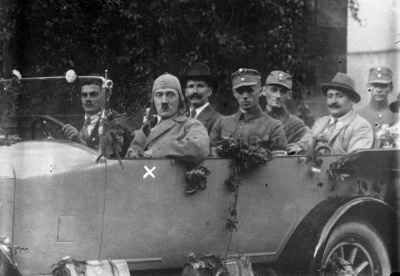
Riding back to Munich in the train, angry and baffled, I saw no humor in my shattered dream of German destiny in the balance, and of myself as the German Paul Revere . . . .
Driving directly to Pittinger's headquarters, I met the great man at the door. He was just getting into a gorgeous motor-coat and looked very haughty in his goggles-ready to speed away in his big Mercedes for his well-earned vacation in the Alps. "Is this the coup d'etat?" I asked him, but he swept magnificently by.
Every one I met was either sheepish, disgusted, or filled with rage, Hitler's men had been the only ones ready to march, I was told. But nobody knew where Hitler was now . . . .
Before finally catching up with Hitler, Ludecke learns how the Munich police had shut down the meeting, and Hitler, left with no allies, had been forced to capitulate.
[Have located Hitler.] With him were only his faithful guard, Ulrich Graf, and a great police-dog. All the late newspapers were scattered about the small table and the floor. . . . When I reported my bootless journey, ending with the encounter with Pittinger, he began to rave.
"I was ready-my men were ready!" he cried, spreading his arms in a wide gesture and letting them fall despairingly to his sides. Then his eyes narrowed. "I have learned," he said. "From now on I go my way alone. Resolutely alone. Even if not a soul follows. These cowards! I shall do it if no one else dares . . . . No more Pittingers, no more Fatherland societies! One party. One single party. These gentlemen-these counts and generals-they won't do anything. I shall. I alone."
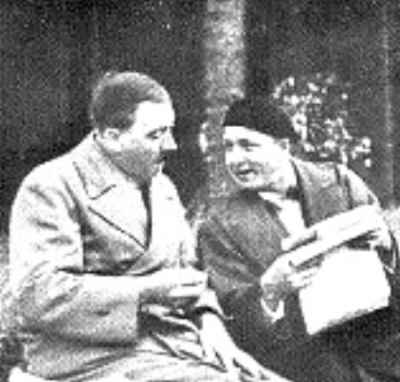
Gone was Hitler's conception of himself as the advance agent, the drummer-boy. On that day of disappointment he became the Fuehrer . . . This failure also altered his entire regard for the "great" people toward whom he had previously shown a certain deference and humility. But his demeanour did not change. He had found that it worked to be naif and simple in a salon, to assume shyness. It was a useful pose, but now it covered scorn. 45
Hitler has been forced to back down in the face of demands by the government, disappointing the hopes and dreams of the troops in his command. He is convinced that his claims to national leadership seem less authentic in consequence of his being humiliated so. No one wants a leader who surrenders, whether or not his allies have left him in the lurch. He vows that the next time events come to such a head, he will not capitulate. He WILL be the leader he aspires to be, and will force the issue to a conclusion, no matter what awaits. 46Internationalization today means only Judaization. We in Germany have come to this: that a sixty-million people sees its destiny to lie at the will of a few dozen Jewish bankers. This was possible only because our civilization had first been Judaized. The undermining of the German conception of personality by catchwords had begun long before. Ideas such as 'Democracy,' 'Majority,' 'Conscience of the World,' 'World Solidarity,' 'World Peace,' 'Internationality of Art,' etc., disintegrate our race-consciousness, breed cowardice; and so today, we are bound to say that the simple Turk is more man than we are. No salvation is possible until the bearer of disunion, the Jew, has been rendered powerless to harm.
[For the full text, Click here.]
I went to Munich. I was curious because someone had said to me, "You must hear Adolf Hitler some time." And now destiny again takes a hand. This tragedy can only be grasped by those whose vision is not limited to the material, but who can perceive those higher vibrations which even today have not had their full outcome.
I went to the Munich Bürgerbräukeller. Adolf Hitler was speaking there. I had only heard his name. I had never seen the man before. And there I sat, an unknown among unknowns. I saw this man shortly before midnight, after he had spoken for 3 hours, drenched in perspiration, radiant. My neighbor said he thought he saw a halo around his head; and I, Gentlemen, experienced something which transcended the commonplace. When he finished his speech, an inner voice bade me get up. I went to the platform. When Adolf Hitler came down, I approached him and told him my name. 50
On Saturday, October 14, at 8 a.m., a special train for members of the NSDAP will depart from the Munich train station for Coburg. All members of the SA as well as other male party members are requested to take part in the trip. . . . Quarters in Coburg will be taken care of. . . . Local groups are to bring along their flags. The meeting will certainly be an unforgettable memory for every participant. 51
SA man Gottfried Schmitt records his experiences on this party adventure in Coburg: "We were to assemble early at the Central Station and bring along rations for two days." Schmitt is one of 800 SA men who will participate in this event, 650 of whom will travel to Coburg on a party-chartered train. 52The band struck up. With flying banners, preceded by eight stalwart Bavarians, huge roughnecks from the Chiemgau, in leather shorts, who carried alpenstocks, but kept their rubber clubs and knives hidden, we moved forward. Hitler and the seven of us in his entourage followed the standard-bearers, and behind us moved the seven hundred men. We swept along the platform, through the undercut and out upon the station square. There we met a great storm of insults from a crowd collected by the Reds to hoot [at] us. Disappointed by our success in flouting the order, they hurled every sort of name at us. We were "murderers, bandits, criminals, hoodlums." 54
SA man Gottfried Schmitt:
At the fire station, they were ready to turn the hoses onto us but just didn't, at the critical moment. Stones, however, began to fly around. Then things got hotter. The Reds set upon us with iron rods and cudgels. That was going a bit too far. Hitler swung round, flourished his walking-stick (that was the signal), and we flung ourselves upon our assailants. We were unarmed save for our fists, but we put up so good a fight that within fifteen minutes not a Red was left to be seen . . . . They rained tiles on us from the roof and windows, and tore up the cobblestones for missiles. I got a thundering blow on the head which had to be attended to before I could carry on. I only found out afterwards how serious the wound was.
Sometimes a man's muscles do his thinking. I sprang from the ranks toward a fellow who was lunging at me with his club uplifted . . . but at the same moment, our entire column had turned on our assailants.
For nearly a quarter of an hour it was an outright battle, man to man. At first the police took no sides, striking at everyone with impartial vigour. But soon, probably because they shared our enthusiastic dislike for the street rabble, most of them took our side, and before long we were masters of the field. . . .
When the fracas was over, I would not have exchanged my own bruises for medals. I had felt until then that the rank and file did not quite accept me. Now I was one of them. Seeing that one brawls as well in an English suit as in shoddy clothes, they forgave me my tailor. 55
Today there are complaints about general misery. It is severe and pressing, but perhaps it has been given to us by Fate as a bit of good fortune. For peoples who lose their character and honor deserve no good fortune, no happy existence. Today, so-called prosperity would be a misfortune. We would forget all humiliation: there would be no more complaining about France if things were going well for us. Our people does not yet deserve earthly goods . . . . the slogan that says that the economy as such could elevate us must be dropped. It is not the economy which builds a state, but rather a people creates its own economy. Day after day we must preach to all Germans a change of character . . . . As long as the world has existed, history has been made by minorities . . . .
Germany and Europe will collapse unless a force arises which stands up for truth and conscience. Scientific knowledge does us no good today, but faith instead, Our [swastika] symbol is not the identification of an organization, but rather a victory banner. It will and must fly above the palace in Berlin and the peasant's hut alike. . . . Resurrection through readiness to act is our answer for the great German Fatherland which is coming! 56
Certainly in the years 1918-1919 the founding of a multitude of new groups, parties, etc., calling themselves ‘Patriotic,’ was a natural phenomenon of the time, for which the founders were not at all responsible. By 1920 the National Socialist German Labor Party had slowly crystallized from all these parties and had become supreme. There could be no better proof of the sterling honesty of certain individual founders than the fact that many of them decided, in a really admirable manner, to sacrifice their manifestly less successful movements to the stronger movement, by joining it unconditionally, and dissolving their own.
This is especially true in regard to Julius Streicher, who was at that time the protagonist of the German Socialist party in Nuremberg. The National Socialist German Labour Party had been founded with similar aims in view, but quite independently of the other. I have already said that Streicher, then a teacher in Nuremberg, was the chief protagonist of the German Socialist Party. He had a sacred conviction of the mission and future of his own movement. As soon, however, as the superior strength and stronger growth of the National Socialist Party became clear and unquestionable to his mind, he gave up his work in the German Socialist Party and called upon his followers to fall into line with the National Socialist German Labor Party, which had come out victorious from the mutual contest, and [to] carry on the fight within its ranks for the common cause. The decision was personally a difficult one for him, but it showed a profound sense of honesty. 59
Adolf Hitler wrote in his book, Mein Kampf, that it must have cost me a great effort to hand over to him the movement which I had created in Nuremberg . . . . Yes, I am proud of it; I forced myself to hand over to Hitler the movement which I had created in Franconia. This Franconian movement gave the movement, which Adolf Hitler had created in Munich and southern Bavaria, a bridge to northern Germany. That was my doing . . . . I went to Munich; and before the public on the platform I handed over my movement to the Fuehrer . . . . No other conference took place with Adolf Hitler or any other person. I returned to Nuremberg and went on making speeches. 60
1922 By the latter part of 1922, Hitler has become a regular Monday night customer of the Cafe Neumaier, bordering Munich's Viktualienmarkt. Among those likely to hang out with Hitler here are Hermann Esser, Rudolf Hess, Christian Weber, Max Amman, Max Erwin von Scheubner-Richter, Ulrich Graf, Gottfried Feder, Dietrich Eckart, and Alfred Rosenberg. After the evening's consumption of tea and pastries, on Hitler's part, and Bavarian beer by most of his mates, the Fuehrer is escorted home by a guard of honor, typically composed of Weber, Amann, Graf, and Johann Klintzsch. 61Then one day, on a Sunday in November or October of 1922, the demand having been made again by the Entente for the extradition of our military leaders, at a protest demonstration in Munich-I went to this protest demonstration as a spectator, without having any connection with it. Various speakers from parties and organizations spoke there. At the end, Hitler too, was called for. I had heard his name once before, briefly, and wanted to hear what he had to say. He declined to speak, and it was pure coincidence that I stood nearby and heard the reasons for his refusal. He did not want to disturb the unanimity of the demonstration; he could not see himself speaking, as he put it, to these tame, bourgeois pirates. He considered it senseless to launch protests with no weight behind them. This made a deep impression on me; I was of the same opinion. 64
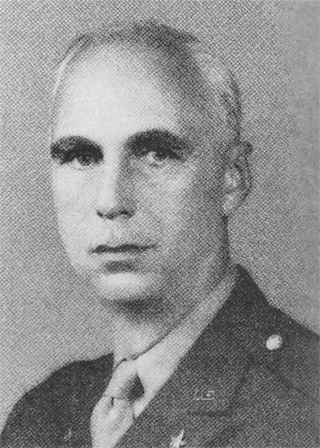
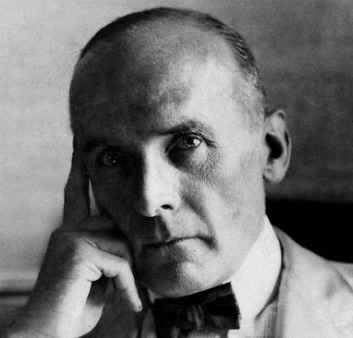
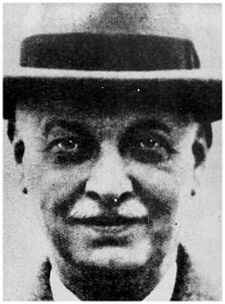
The most active political force in Bavaria at this time is the National Socialist Labor Party. Less a political party than a popular fascisti . . . . It has recently acquired a political influence quite disproportionate to its actual numerical strength . . . . His ability to influence a popular assembly is uncanny. In private conversation he disclosed himself as a forceful and logical speaker, which, when tempered with a fanatical earnestness, made a very deep impression on a neutral listener . . . . 73
The question whether Hitler's National Socialists can play a role in Germany equivalent to the role of the Fascisti in Italy can still not be answered with any degree of certainty. In the limited area of Bavaria, south of the Danube, Hitler's success cannot be gainsaid . . . . It is believed that not only in Munich but in all Germany, there is a fertile field even among the factory workers for a national movement . . . .
It seems hardly probable, furthermore, that with the results already achieved, there will be any lack of money for the propagation of the idea of a national dictatorship. These facts, coupled with the magnetism and oratorical ability of the National Socialist leader, speak for a rapid and consistent development of the German "Fascisti." 74
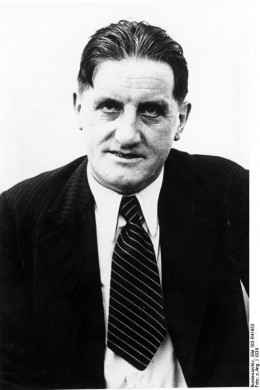
"Really," I replied. "What's his name?"
"Adolf Hitler."
"You must have the name wrong," I said. "Don't you mean Hilpert, the German nationalist fellow, although I can't say I see anything particularly remarkable in him."
"No, no," Truman Smith insisted. "Hitler. There are quite a lot of placards up announcing a meeting this evening . . . . I have the impression he is going to play a big part and whether you like him or not he certainly knows what he wants . . . . He really seems to have a sense of direction which none of the others have. They gave me a press ticket for this meeting this evening, and now I shall not be able to go. Could you possibly have a look at him for me and let me know your impression?" 75
There seemed to be a lot of people of the concierge or small-shopkeeper class, a sprinkling of the former officer and minor- civil-servant type, a tremendous number of young people and the rest artisans, with a high proportion of the spectators in Bavarian national costume . . . .
In his heavy boots, dark suit and leather waistcoat, semi-stiff white collar and odd little moustache, he [Hitler] really did not look very impressive. . . . However, when Drexler introduced him to a roar of applause, Hitler straightened up and walked past the press table with a swift, controlled step, the unmistakable soldier in mufti . . . . the atmosphere in the hall was electric . . . . There was almost a note of Viennese coffeehouse conversation in the grace of some of his phrases and the sly malice of his insinuations. There was no doubt of his Austrian origin . . . .
He scored his points all round the compass. First he would criticize the Kaiser as a weakling and then he rounded on the Weimar republicans for conforming with the victors' demands, which were stripping Germany of everything but the graves of her war dead. There was a strong note of appeal to the ex-servicemen in his audience. ... He dwelt at length on patriotism and national pride . . . . he thundered at the Communists and Socialists for desiring the disruption of German traditions . . . .
[In case of hecklers] Then Hitler would raise his right hand, as if catching a ball, or would fold his arms and with one or two words bring the audience over to his side. His technique resembled the thrusts and parries of a fencer, or the perfect balance of a tightrope walker. Sometimes he reminded me of a skilled violinist, who, never coming to the end of his bow, always left just the faint anticipation of a tone - a thought spared the indelicacy of utterance.
Hitler had been talking for sixty minutes. I looked round at the audience. Where was the nondescript crowd I had seen only an hour before? What was suddenly holding these people, who on the hopeless incline of the falling mark were engaged in a daily struggle to keep themselves within the line of decency? The hubbub and chattering had stopped and they were drinking in every word. Only a few yards away there was a young woman, her eyes fastened on the speaker. Transfigured as though in some devotional ecstasy, she had ceased to be herself, and was completely under the spell of Hitler's despotic faith in Germany's future greatness . . . .
I was really impressed beyond measure by Hitler . . . . With his incredible gifts as an orator, he was clearly going to go far, and from what I had seen of his entourage there seemed no one likely to bring home to him the picture of the outside world he manifestly lacked, and in this I felt I might be able to help . . . .
Naive and yet forceful, obliging and yet uncompromising, he stood, face and hair soaked in perspiration, his semi-stiff collar, fastened with a square, imitation gold safety-pin, [as if he had] melted to nothing. While talking, he dabbed his face with a handkerchief, glancing worriedly at the many open exits through which came the draughts of a cold November night. 76
Kurt Ludecke is at this meeting as well, trying to recruit "one of the richest princes in Germany" into the movement:
The fellow turned out to be an exquisite young man who suffered tortures at such intimate contact with the rough masses. Attending incognito, of course, he received such a jostling ... that he became almost ill; the close air overwhelmed him, and possibly he was frightened to learn that the lower classes could think and talk. I gave him up as a possible Nazi fighter. Nearly in tears, he fled outside to his Mercedes. [77
Ernst Hanfstaengl of Harvard fame, who was hearing Hitler for the first time and was enthralled by the sheer artistry of his show, saw me leaving. Taking advantage of our slight acquaintance, he edged up for an introduction and drove away with us.
So violent are Hitler's fulminations against the Jews that a number of prominent Jewish citizens are reported to have sought safe asylums in the Bavarian highlands, easily reached by fast motor cars, whence they could hurry their women and children when forewarned of an anti-Semitic St. Bartholomew's night. 79
1922 November - December Ernst 'Putzi' Hanfstaengl and Adolf Hitler rapidly become close friends. Hitler is a frequent guest at the Hanfstaengls', and is a big hit with the couple's young son, Egon.Hitler could always be relied upon to lay on the charm when around children. How much of this was the typical calculation of the politician-nothing so endears a voter than to have a candidate dote after their child-and how much was a real love of children is difficult to quantify. While it is true that he continued this behavior long past the point where he had any need to worry about elections, it is also true that he had no compunctions when it came to sending children to fight the Red Army besieging Berlin in 1945. Nevertheless, it is an established fact that Hitler could be exceedingly charming when he had a mind to be, and he was always in this mind when it came to the wives, daughters, and granddaughters of his supporters. Sincerity is difficult to gauge in any human being, and in Hitler it is even more difficult to do so.
Putzi's picture of Hitler and his own wife, Helene:He was delighted with my wife, who was blond and beautiful and American. He accepted very readily when she said how pleased we would be if he would come to coffee or dinner at the flat. Soon he was visiting us frequently, pleasant and unassuming in his too-small blue serge suit. He was respectful, even diffident and very careful to adhere to the forms of address still de rigueur in Germany between-what shall I say?-people of lower rank when speaking to those of better education, title or academic attainment. The only striking things about him were an extraordinary luminous quality in his blue eyes and his sensitive hands, plus of course very definite gifts of expression in conversation.
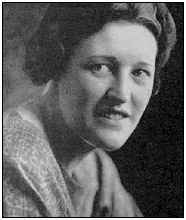
He was at the time a slim, shy, young man, with a far-away look in his very blue eyes. He was dressed almost shabbily-a cheap white shirt, black tie, a worn dark blue suit, with which he wore an incongruous dark brown leather vest, a beige-colored trench coat, much the worse for wear, cheap black shoes, and a soft, old, greyish hat. His appearance was quite pathetic." 80
Putzi Hanfstaengl, in addition to his easy-going and fun-loving personality, has a talent Hitler greatly admires. Visiting Hitler in his humble apartment, Hanfstaengl sits in front of an old upright piano in the entrance hall, and begins to play: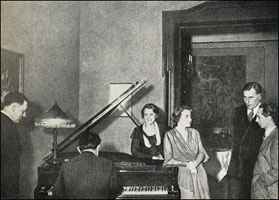
I played a Bach fugue, to which he sat listening in a chair, nodding his head in vague non-interest. Then I started the prelude to the Meistersinger. This was it. This was Hitler's meat. He knew the thing absolutely by heart and could whistle every note of it in a curious penetrating vibrato, but completely in tune. He started to march up and down the hall, waving his arms as if he were conducting an orchestra. He really had an excellent feeling for the spirit of the music, certainly as good as many a conductor. This music affected him physically, and by the time I had crashed through the finale he was in splendid spirits, all his worries gone.
After that we had innumerable sessions together . . . . In the end it always had to be Wagner, Meistersinger, Tristan und Isolde, and Lohengrin. I must have played them hundreds of times, and he never grew tired of listening. He had a very genuine knowledge and appreciation of Wagner's music, which he had picked up somewhere, probably in his Vienna days, long before I knew him.
He could sprawl for hours like a crocodile dozing in the Nile mud, or a spider immobile in the center of its web. He would chew his nails, look boredly [sic] into space, and sometimes whistle. As soon as some person of interest-and there was no one he did not find interesting for a time-joined his company, you could almost see him mobilizing his internal machinery. The sonar pings of inquiry would go out and within a short time he had a clear image of the secret yearnings and emotions of his partner. The pendulum of conversation would start to move faster, and the person would be hypnotized into believing that there lay in Hitler immense depths of sympathy and understanding. He had the most formidable power of persuasion of any man or woman I have ever met, and it was almost impossible to avoid being enveloped by him. 81
1922 November 30 In order to counter a series of speeches by Erhard Auer-the Social Democratic leader-Hitler creates a sort of political blitzkrieg dynamic for public meetings. The NSDAP schedules five Hitler speeches at five separate beer halls in one night. Each hall has a full line-up of speakers, and each meeting in turn interrupts its individual speaking order to accommodate Hitler, whenever he shows up. The tactic is an unqualified success. 82
The National Socialists reject the popular phrase of the "Revision of the Peace of Versailles" as such a revision might perhaps bring a few numerical reductions in the so-called "obligations"; but the entire German people would still be, just as before, the slave of other nations . . . . We demand equality for the German people with other nations, the cancellation of the peace treaties of Versailles and St. Germain . . . .
But National Socialism still believes that its principles and ideology-though in individual methods of fight according to various racial conditions-will be directives far beyond the borders of Germany for the inevitable fights for power in other countries of Europe and America. There too, a clear line of thought must be drawn, and the racial-nationalistic fight against the everywhere-similar loan-capitalistic and Marxist-internationalism must be taken up. National Socialism believes that once the great world battle is concluded, after the defeat of the present epoch, there will be a time when the swastika will be woven into the different banners of the Germanic peoples as the Aryan symbol of rejuvenation. 84
Judging others by themselves, the English, who are blinded by their loyalty, have always thought that the Germans did not abide by their pledges inscribed in the Versailles Treaty because they had not frankly agreed to them . . . . We, on the contrary, believe that if Germany, far from making the slightest effort to carry out the treaty of peace, has always tried to escape her obligations, it is because until now she has not been convinced of her defeat . . . . We are also certain that Germany, as a nation, resigns herself to keep her pledged word only under the impact of necessity. 86
1922 December 13 The Hitler political blitzkrieg hits Munich once again. This time, Hitler speaks at ten separate meetings, from 8:30 p. m. to midnight. 87


Written by Walther Johann von Löpp
Copyright © 2011-2013 All Rights Reserved Edited by Levi Bookin — Copy Editor
European History and Jewish Studies





Click to join 3rdReichStudies
Disclaimer:The Propagander!™ includes diverse and controversial materials--such as excerpts from the writings of racists and anti-Semites--so that its readers can learn the nature and extent of hate and anti-Semitic discourse. It is our sincere belief that only the informed citizen can prevail over the ignorance of Racialist "thought." Far from approving these writings, The Propagander!™ condemns racism in all of its forms and manifestations.
Fair Use Notice: This site--The Propagander!™--may contain copyrighted material the use of which has not always been specifically authorized by the copyright owner. We are making such material available in our efforts to advance understanding of historical, political, human rights, economic, democracy, scientific, environmental, and social justice issues, etc. We believe this constitutes a "fair use" of any such copyrighted material as provided for in section 107 of the US Copyright Law. In accordance with Title 17 U.S.C. Section 107, the material on this site is distributed without profit to those who have expressed a prior interest in receiving the included information for research and educational purposes. If you wish to use copyrighted material from this site for purposes of your own that go beyond 'fair use', you must obtain permission from the copyright owner.